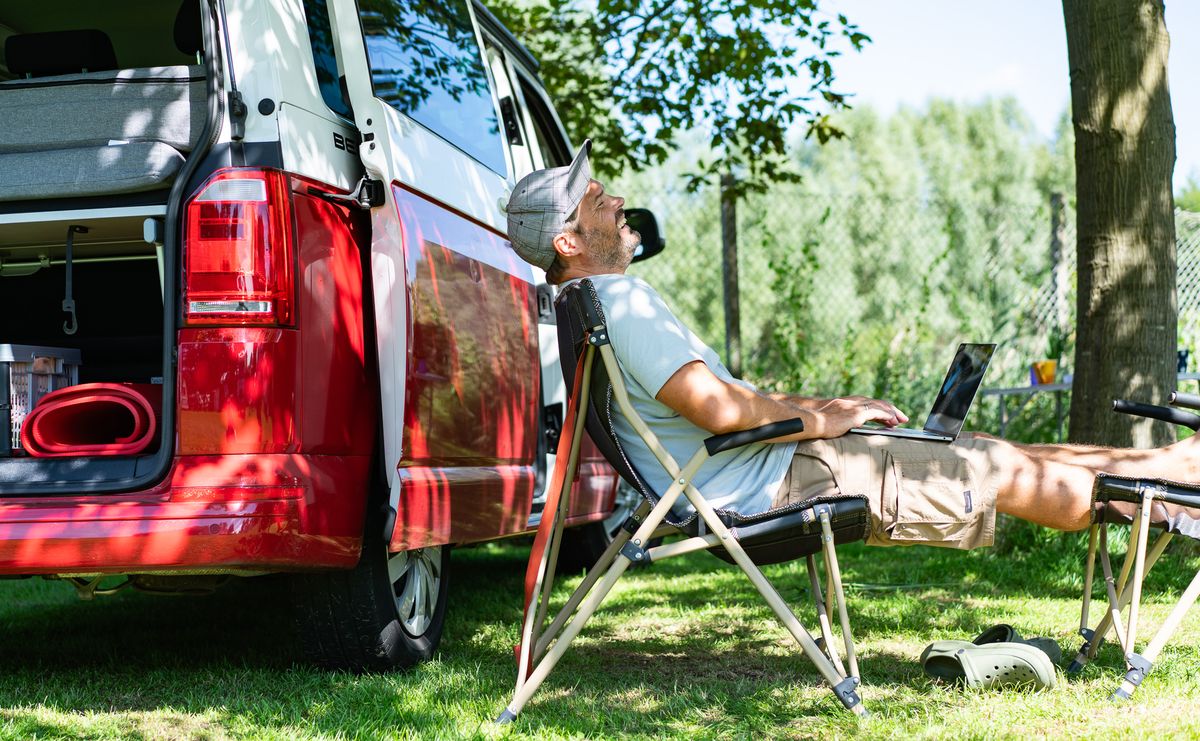The idea of simply driving off with the camper and stopping at the nearest lake, setting up the tents and unpacking the grill appeals to many people who live the dream of van life.
Many campsites sometimes resemble huge hotel complexes with fitness studios, luxurious spa and sauna areas and restaurants that offer all-day dining.
For all the campers who are looking for a camping holiday in nature, they are not looking for this luxury. It is more about being surrounded by incredibly beautiful nature, forests and lakes. And when you wake up in the morning, you can hear nothing but the sound of the stream or the birds chirping.
However, wild camping is not possible in Germany .
But here too, a clear distinction must be made between "normal" wild camping and wild camping with a camper, caravan or van. In fact, most wild camping articles refer to hikers or cyclists who have a tent with them and set up camp on remote paths. In some countries, the "right of public access" applies to this, which allows everyone to use nature freely and respectfully. This also means not leaving any rubbish behind, removing your tracks and, ideally, leaving your pitch cleaner than when you arrived. You are allowed to stay overnight in nature reserves for up to two days, but national parks are often excluded from this rule.
Now we are interested in what the rules are for mobile homes, caravans or vans. As already mentioned, classic wild camping is not possible in Germany. There are specially designated parking spaces where mobile homes or caravans can stay overnight. If you don't want to stay on a campsite but are looking for the feeling of wild camping, we can recommend the Park4Night app. There are designated parking spaces especially for campers. Sometimes they are simple parking spaces, sometimes they are really beautiful, remote places, which are very similar to wild camping.
Another great alternative is the Landvergnügen platform. This is a platform for winemakers, farms and family businesses that have 1-2 parking spaces available. These spaces are free, but out of courtesy you are asked to look around the farm shop and buy their specialty products. We think that's more than fair. In order to take part in Landvergnügen, you have to buy a vignette, which usually sells out right at the beginning of the year. The number is very limited each year.
There are now also similar platforms to Landvergnügen, such as Schauaufsland or Caravanya.
But back to wild camping. If we can't reach our campsite or other destination because we're tired and urgently need a break, we can also spend the night in our motorhome or caravan "to regain our ability to drive". The authorities usually assume a period of up to 10 hours. It's important that you don't set up camp and unpack the camping chairs.
But wild camping is not possible in Germany
But here, too, a strong distinction must be made between “normal” wild camping and wild camping with a motorhome, caravan or van.
In fact, most wild camping articles refer to hikers or cyclists who have a tent with them and set up camp on remote paths. In some countries, the "everyman's right" applies to this, which allows everyone to use nature freely and respectfully.
This also means not leaving any rubbish behind, removing your tracks and, ideally, leaving your pitch cleaner than when you arrived. Although you are allowed to stay overnight in nature reserves for up to two days, national parks are often excluded from this rule.
Now we are interested in what the rules are for mobile homes, caravans or vans. As already mentioned, classic wild camping is not possible in Germany.
There are specially designated parking spaces where camper vans or caravans can stay overnight. If you don't want to stay on a campsite but want the feeling of wild camping, we can recommend the Park4Night app. There are designated parking spaces especially for campers. Sometimes they are simple parking spaces, sometimes they are really beautiful, remote places, which are very similar to wild camping.
Another great alternative is the Landvergnügen platform. This is a platform for winemakers, farms and family businesses that have 1-2 parking spaces available. These spaces are free, but out of courtesy you are asked to look around the farm shop and buy their specialty products. We think that's more than fair. In order to take part in Landvergnügen, you have to buy a vignette, which usually sells out right at the beginning of the year. The number is very limited each year.
There are now also similar platforms to Landvergnügen, such as Schauaufsland or Caravanya.
But back to wild camping.
If we cannot reach our campsite or other destination because we are tired and urgently need to take a break, we can also spend the night in our motorhome or caravan "to regain our ability to drive". The authorities usually assume a period of up to 10 hours . It is important that you do not set up your home and unpack the camping chairs.



